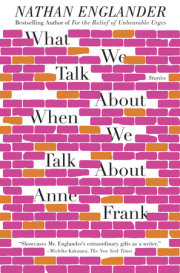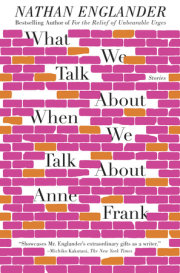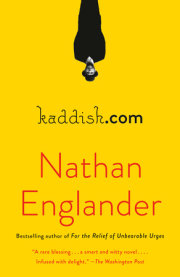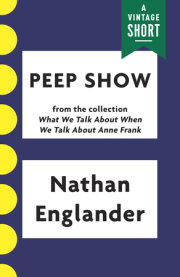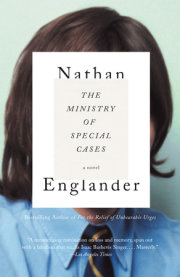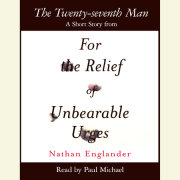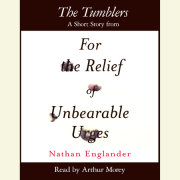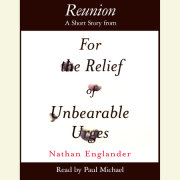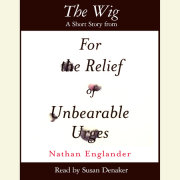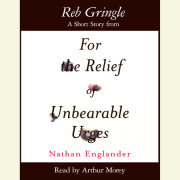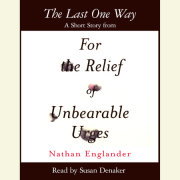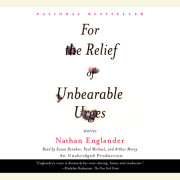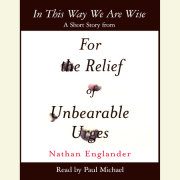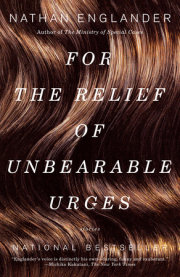What We Talk About When We Talk About Anne FrankThey’re in our house maybe ten minutes and already Mark’s lecturing us on the Israeli occupation. Mark and Lauren live in Jerusalem, and people from there think it gives them the right.
Mark is looking all stoic and nodding his head. “If we had what you have down here in South Florida . . . ,” he says, and trails off. “Yup,” he says, and he’s nodding again. “We’d have no troubles at all.”
“You
do have what we have,” I tell him. “All of it. Sun and palm trees. Old Jews and oranges and the worst drivers around. At this point,” I say, “we’ve probably got more Israelis than you.” Debbie, my wife, she puts a hand on my arm. Her signal that I’m taking a tone, or interrupting someone’s story, sharing something private, or making an inappropriate joke. That’s my cue, and I’m surprised, considering how much I get it, that she ever lets go of my arm.
“Yes, you’ve got it all now,” Mark says. “Even terrorists.”
I look to Lauren. She’s the one my wife has the relation- ship with—the one who should take charge. But Lauren isn’t going to give her husband any signal. She and Mark ran off to Israel twenty years ago and turned Hassidic, and neither of them will put a hand on the other in public. Not for this. Not to put out a fire.
“Wasn’t Mohamed Atta living right here before 9/11?” Mark says, and now he pantomimes pointing out houses. “Goldberg, Goldberg, Goldberg—Atta. How’d you miss him in this place?”
“Other side of town,” I say.
“That’s what I’m talking about. That’s what you have that we don’t. Other sides of town. Wrong sides of the tracks. Space upon space.” And now he’s fingering a granite countertop in our kitchen, looking out into the living room and the dining room, staring through the kitchen windows out at the pool. “All this house,” he says, “and one son? Can you imagine?”
“No,” Lauren says. And then she turns to us, backing him up. “You should see how we live with ten.”
“Ten kids,” I say. “We could get you a reality show with that here in the States. Help you get a bigger place.”
The hand is back pulling at my sleeve. “Pictures,” Debbie says. “I want to see the girls.” We all follow Lauren into the den for her purse.
“Do you believe it?” Mark says. “Ten girls!” And the way it comes out of his mouth, it’s the first time I like the guy. The first time I think about giving him a chance.
...
Facebook and Skype brought Deb and Lauren back together. They were glued at the hip growing up. Went to school together their whole lives. Yeshiva school. All girls. Out in Queens through high school and then riding the subway together to one called Central in Manhattan. They stayed best friends forever until I married Deb and turned her secular, and soon after that Lauren met Mark and they went off to the Holy Land and went from Orthodox to
ultra-Orthodox, which to me sounds like a repackaged detergent—ORTHODOX ULTRA®, now with more deep-healing power. Because of that, we’re sup- posed to call them Shoshana and Yerucham. Deb’s been doing it. I’m just not saying their names.
“You want some water?” I offer. “Coke in the can?” “
‘You’—which of us?” Mark says.
“
You both,” I say. “I’ve got whiskey. Whiskey’s kosher, too,
right?” “If it’s not, I’ll kosher it up real fast,” he says, pretending
to be easygoing. And right then, he takes off that big black hat and plops down on the couch in the den.
Lauren’s holding the verticals aside and looking out at the yard. “Two girls from Forest Hills,” she says. “Who ever thought we’d be the mothers of grown-ups?”
“Trevor’s sixteen,” Deb says. “You may think he’s a grown-up, and he may think he’s a grown-up—but we, we are not convinced.”
“Well,” Lauren says, “then whoever thought we’d have kids raised to think it’s normal to have coconuts crashing out back and lizards climbing the walls?”
Right then is when Trev comes padding into the den, all six feet of him, plaid pajama bottoms dragging on the floor and T-shirt full of holes. He’s just woken up and you can tell he’s not sure if he’s still dreaming. We told him we had guests. But there’s Trev, staring at this man in the black suit, a beard rest- ing on the middle of his stomach. And Lauren, I’d met her once before, right when Deb and I got married, but ten girls and a thousand Shabbos dinners later—well, she’s a big woman, in a bad dress and a giant blond Marilyn Monroe wig. Seeing them at the door, I can’t say I wasn’t shocked myself. But the boy, he can’t hide it on his face.
“Hey,” he says.
And then Deb’s on him, preening and fixing his hair and hugging him. “Trevy, this is my best friend from childhood,” she says. “This is Shoshana, and this is—”
“Mark,” I say.
“Yerucham,” Mark says, and sticks out a hand. Trev shakes it. Then Trev sticks out his hand, polite, to Lauren. She looks at it, just hanging there in the air—offered.
“I don’t shake,” she says. “But I’m so happy to see you. Like meeting my own son. I mean it,” she says. And here she starts to cry, for real. And she and Deb are hugging and Deb’s crying, too. And the boys, we just stand there until Mark looks at his watch and gets himself a good manly grip on Trev’s shoulder.
“Sleeping until three on a Sunday? Man, those were the days,” Mark says. “A regular little Rumpleforeskin.” Trev looks at me, and I want to shrug, but Mark’s also looking, so I don’t move. Trev just gives us both his best teenage glare and edges out of the room. As he does, he says, “Baseball practice,” and takes my car keys off the hook by the door to the garage.
“There’s gas,” I say. “They let them drive here at sixteen?” Mark says.
“Insane.”
...
“So what brings you,” I say, “after all these years?” Deb’s too far away to grab at me, but her face says it all. “Was I sup- posed to know?” I say. “Jeez, Deb must have told me. She told me, for sure. My fault.”
“My mother,” Mark says. “She’s failing and my father’s get- ting old—and they come to us for Sukkot every year. You know?”
“I know the holidays,” I say.
“They used to fly out to us. For Sukkot and Pesach, both. But they can’t fly now, and I just wanted to get over while things are still good. We haven’t been in America—”
“Oh, gosh,” Lauren says. “I’m afraid to think how long it’s been. More than ten years. Twelve,” she says. “Twelve years ago. With the kids, it’s just impossible until enough of them are big. This might be”—and now she plops down on the couch—“this might be my first time in a house with no kids under the roof in that long. Oh my. I’m serious. How weird. I feel faint. And when I say
faint,” she says, standing up, giving an oddly girlish spin around, “what I mean is giddy.”
“How do you do it?” Deb says. “Ten kids? I really do want to hear.”
That’s when I remember. “I forgot your drink,” I say to Mark.
“Yes, his drink. That’s how,” Lauren says. “That’s how we cope.”
...
And that’s how the four of us end up back at the kitchen table with a bottle of vodka between us. I’m not one to get drunk on a Sunday afternoon, but I tell you, with a plan to spend the day with Mark, I jump at the chance. Deb’s drinking, too, but not for the same reason. For her and Lauren, I think they’re reliving a little bit of the wild times. The very small window when they were together, barely grown-up, two young women living in New York on the edge of two worlds. And they just look, the both of them, so overjoyed to be reunited, I think they’re half celebrating and half can’t handle how intense the whole thing is.
Deb says, as she’s already on her second, “This is really racy for us. I mean
really racy. We try not to drink much at all these days. We think it sets a bad example for Trevor. It’s not good to drink in front of them right at that age when they’re all transgressive. He’s suddenly so interested in that kind of thing.”
“I’m just happy when he’s interested in something,” I say.
Deb slaps at the air. “I just don’t think it’s good to make drinking look like it’s fun with a teenager around.”
Lauren smiles and straightens her wig. “Does anything we do look fun to our kids?” I laugh at that. Honestly, I’m really liking her more and more.
“It’s the age limit that does it,” Mark says. “It’s the whole American puritanical thing, the twenty-one-year-old drinking age and all that. We don’t make a big deal about it in Israel, and so the kids, they don’t even notice alcohol. Except for the foreign workers on Fridays, you hardly see anyone drunk at all.”
“The workers and the Russians,” Lauren says.
“The Russian immigrants,” he says, “that’s a whole sepa- rate matter. Most of them, you know, not even Jews.”
“What does that mean?” I say.
“It means matrilineal descent, is what it means,” Mark says. “It means with the Ethiopians there were conversions.”
But Deb wants to keep us away from politics, and the way we’re arranged, me in between them and Deb opposite (it’s a round table, our kitchen table), she practically has to throw her- self across to grab hold of my arm. “Fix me another,” she says.
And here she switches the subject to Mark’s parents. “How’s the visit been going?” she says, her face all somber. “How are your folks holding up?”
Deb is very interested in Mark’s parents. They’re Holocaust survivors. And Deb has what can only be called an unhealthy obsession with the idea of that generation being gone. Don’t get me wrong. It’s important to me, too. I care, too. All I’m saying is, there’s healthy and unhealthy, and my wife, she gives this subject a lot,
a lot, of time. “Do you know,” she’ll say to me and Trevor, just absolutely out of nowhere, “World War Two veterans die at a rate of a thousand a day?”
“What can I say?” Mark says. “My mother’s a very sick woman. And my father, he tries to keep his spirits up. He’s a tough guy.”
“I’m sure,” I say. And then I look in my drink, all serious, and give a shake of my head. “They really are amazing.”
“Who?” Mark says. “Fathers?”
I look back up and they’re all three staring at me. “Survivors,” I say, seeing I jumped the gun.
“There’s good and bad,” Mark says. “Like anyone else.” And then he laughs. “Though there isn’t anyone else in my par- ents’ place.”
Lauren says, “You should see it. The whole of Carmel Lake Village, it’s like a DP camp with a billiards room. They’re all there.”
“One tells the other,” Marks says, “and they follow. It’s amazing. From Europe to New York, and now, for the end of their lives, again the same place.”
“Tell them that crazy story,” Lauren says. “Tell them, Yuri.”
“Tell us,” Deb says. And I can see in her eyes that she wants it to be one of those stories of a guy who spent three years hiding inside one of those cannons they use for the circus. And at the end of the war, a Righteous Gentile comes out all joyous and fires him through a hoop and into a tub of water, where he discovers his lost son breathing through a straw.
“So you can picture my father,” Mark says, “in the old country, he went to
heder, had the peyes and all that. But in America, a classic
galusmonger. He looks more like you than me. It’s not from him that I get this,” he says, pointing at his beard. “Shoshana and I—”
“We know,” I say.
“So my father. They’ve got a nice nine-hole course, a driving range, some greens for the practice putting. And my dad, he’s at the clubhouse. I go with him. He wants to work out in the gym, he says. Tells me I should come. Get some exercise. And he tells me”—and here Mark points at his feet, sliding a leg out from under the table so we can see his big black clodhoppers—“‘You can’t wear those Shabbos shoes on the treadmill. You need the sneakers. You know, sports shoes?’ he says. And I tell him, ‘I know what sneakers are. I didn’t forget my English any more than your Yiddish is gone.’ And so he says, ‘
Ah shaynem dank dir in pupik.’ Just to show me who’s who.”
“The point,” Lauren says. “Tell them the point.”
“So he’s sitting in the locker room, trying to pull a sock on, which is, at that age, basically the whole workout in itself. It’s no quick business. And I see, while I’m waiting, and I can’t believe it. I nearly pass out. The guy next to him, the number on his arm, it’s three before my father’s number. You know, in sequence.”
“What do you mean?” Deb says.
“I mean, the number tattooed. It’s the same as my father’s camp number, digit for digit, but my father’s ends in an eight. And this guy’s, it ends in a five. That’s the only difference. I mean, they’re separated by two people. And I look at this guy. I’ve never seen him before in my life. So I say, ‘Excuse me, sir’ to the guy. And he just says, ‘You with the Chabad? I don’t want anything but to be left alone. I already got candles at home.’ I tell him, ‘No. I’m not. I’m here visiting my father.’ And to my father, I say, ‘Do you know this gentleman? Have you two met? I’d really like to introduce you, if you haven’t.’ And they look each other over for what, I promise you, is minutes. Actual minutes. It is—with
kavod I say this, with respect for my father— but it is like watching a pair of big beige manatees sitting on a bench, each with one sock on. They’re just looking each other up and down, everything slow. And then my father says, ‘I seen him. Seen him around.’ The other guy, he says, ‘Yes, I’ve seen.’ ‘You’re both survivors,’ I tell them. ‘Look, look,’ I say. ‘The numbers.’ And they look. ‘They’re the same,’ I say. And they both hold out their arms to look at the little ashen tattoos. ‘The same,’ I tell them. And to my father, I say, ‘Do you get it? The same, except his—his, it’s right ahead of yours. Look! Compare.’ So they look. They compare.” And to us now, Mark’s eyes are pop- ping out of his head. “I mean, think about it,” he says. “Around the world, surviving the unsurvivable, these two old guys end up with enough money to retire to Carmel Lake and play golf every day. So I say to my dad, ‘He’s right ahead of you,’ I say. ‘Look, a five,’ I say. ‘And yours is an eight.’ And the other guy looks and my father looks, and my father says, ‘All that means is, he cut ahead of me in line. There, same as here. This guy’s a cutter, I just didn’t want to say.’ ‘Blow it out your ear,’ the other guy says. And that’s it. Then they get back to putting on socks.”
Deb looks crestfallen. She was expecting something empowering. Some story with which to educate Trevor, to reconfirm her belief in the humanity that, from inhumanity, forms. So now she’s just staring, her mouth hanging on to this thin, watery smile.
But me, I love that kind of story. I’m starting to take a real shine to both these two, and not just because I’m suddenly feeling sloshed.
“Good story, Yuri,” I say, copying his wife. “Yerucham,” I say, “that one’s got zing.”
Yerucham hoists himself up from the table, looking proud. He checks the label of our white bread on the counter—making sure it’s kosher. He takes a slice, pulls off the crust, and rolls the white part against the countertop with the palm of his hand. He rolls it up into a little ball. He comes over and pours himself a shot and throws it back. And then he eats that crazy dough ball. Just tosses it in his mouth, as if it’s the bottom of his own personal punctuation mark—you know, to underline his story.
“Is that good?” I say.
“Try it,” he says. He goes to the counter and slings me, through the air, he pitches me a slice of white bread, and says, “But first pour yourself a shot.”
I reach for the bottle and find that Deb’s got her hands around it, and her head’s bowed down, like the bottle is anchor- ing her, keeping her from tipping back.
“Are you okay, Deb?” Lauren says. She’s got a hand on Deb’s neck, and then switches to rubbing her arm. And I know what it is. I know what it is and I just up and say it: “It’s because it was funny.”
“Honey!” Deb says.
“She won’t tell you, but she’s a little obsessed with the Holocaust. And that story, no offense, Mark, it’s not what she had in mind.”
Mark is staring back and forth between us. And, honestly, the guy looks hurt. And I should leave it be, I know. But I just have to go on. It’s not like someone from Deb’s high school is around every day offering insights.
“It’s like she’s a survivor’s kid, my wife. It’s crazy, that edu- cation they give them. Her grandparents were all born in the Bronx, but it’s like, I don’t know. It’s like here we are twenty minutes from downtown Miami, but really it’s 1937 and we live on the edge of Berlin. It’s astounding.”
“That’s not it!” Deb says, openly defensive, her voice just super high up on the register. “I’m not upset about that. It’s just the alcohol. All this alcohol,” she says, and rolls her eyes, mak- ing light. “It’s that and seeing Lauren. Seeing Shoshana, after all this time.”
“Oh, she was always like this in high school,” Shoshana says. “Sneak one drink, and she started to cry.”
“Alcohol is a known depressive,” Yerucham says. And for that, for stating facts like that, he’s straight on his way to being disliked again.
“You want to know what used to get her going, what would make her truly happy?” Shoshana says. And I tell you, I don’t see it coming. I’m as blindsided as Deb was with that numbers story.
“It was getting high,” Shoshana says. “That’s what always did it. Smoking up, it would just make her laugh for hours and hours.”
“Oh my God,” Deb says, but not to Shoshana. She’s point- ing at me, likely because I look as startled as I feel. “Look at my big bad secular husband,” Deb says. “He really can’t handle it. He can’t handle his wife’s having any history of naughtiness at all—Mr. Liberal Open-Minded.” And to me, she says, “How much more chaste a wife can you dream of than a modern-day Yeshiva girl who stayed a virgin until twenty-one? Honestly,” she says, “what did you think Shoshana was going to say was so much fun?”
“Honestly-honestly?” I say. “I don’t want to. It’s embar- rassing.”
“Let’s hear,” Mark says. “We’re all friends here. New friends, but friends.”
“I thought you were—,” I say, and I stop. “You’ll kill me.”
“Say it!” Deb says, positively glowing. “Honestly, I thought you were going to say it was something like competing in the Passover Nut Roll, or making sponge cake. Something like that.” I hang my head. And Shoshana and Deb are just laughing so hard, they can’t breathe. They’re grabbing at each other, so that I can’t tell, really, if they’re holding each other up or pulling each other down. I’m afraid one of them’s going to fall.
“I can’t believe you told him about the nut roll,” Shoshana says.
“And I can’t believe,” Deb says, “you just told my husband of twenty-two years how much we used to get high. I haven’t touched a joint since before we were married,” she says. “Have we, honey? Have we smoked since we got married?”
“No,” I say. “It’s been a very long time.”
“So, come on, Shosh. When was it? When was the last time you smoked?”
Now, I know I mentioned the beard on Mark. But I don’t know if I mentioned how hairy a guy he is. It grows, that thing, right up to his eyeballs. Like having eyebrows on top and bot- tom both. It’s really something. So when Deb asks the question, the two of them, Shosh and Yuri, they’re basically giggling like children, and I can tell, in the little part that shows, in the bit of skin I can see, that Mark’s eyelids and earlobes are in full blush.
“When Shoshana said we drink to get through the days,” Mark says, “she was kidding about the drinking.”
“We don’t drink much,” Shoshana says. “It’s smoking that she means,” he says. “We smoke,” Lauren says, reconfirming. “Cigarettes?” Deb says.
“We still get high,” Shoshana says. “I mean, all the time.”
“Hassidim!” Deb screams. “You’re not allowed! There’s no way.”
“Everyone does in Israel. It’s like the sixties there,” Mark says. “Like a revolution. It’s the highest country in the world. Worse than Holland, and India, and Thailand put together. Worse than anywhere, even Argentina—though they may have us tied.”
“Well, maybe that’s why the kids aren’t interested in alcohol.”
And Yerucham admits that maybe this is so.
“Do you want to get high now?” Deb says. And we all three look at her. Me, with surprise. And those two just with straight longing.
“We didn’t bring,” Shoshana says. “Though it’s pretty rare anyone at customs peeks under the wig.”
“Maybe you guys can find your way into the glaucoma underground over at Carmel Lake,” I say. “I’m sure that place is rife with it.”
“That’s funny,” Mark says.
“I’m funny,” I say, now that we’re all getting on.
“We’ve got pot,” Deb says.
“We do?” I say. “I don’t think we do.” Deb looks at me and bites at the cuticle on her pinkie.
“You’re not secretly getting high all these years?” I say, feeling honestly like maybe I’m about to get a whole list of deceptions. I really don’t feel well at all.
“Our son,” Deb says.
“He has pot.”
“Our son?” “Trevor,” she says.
“Yes,” I say. “I know which one.”
Copyright © 2012 by Nathan Englander. All rights reserved. No part of this excerpt may be reproduced or reprinted without permission in writing from the publisher.



